generals
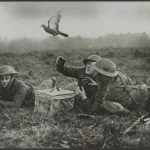
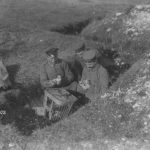 During World War II, transferring intel from the spies in France…the resistance, was difficult. To fly a plane through the anti-aircraft fire was dangerous, and often not successful. To send a spy on foot was not only something that would take far too long, not to mention the possibility of being caught. The intelligence community had to come up with a way to get the information to the generals and to the president quickly…and it had to be a way to succeed without massive loss of life.
During World War II, transferring intel from the spies in France…the resistance, was difficult. To fly a plane through the anti-aircraft fire was dangerous, and often not successful. To send a spy on foot was not only something that would take far too long, not to mention the possibility of being caught. The intelligence community had to come up with a way to get the information to the generals and to the president quickly…and it had to be a way to succeed without massive loss of life.
After much discussion, they happened on the idea of using homing pigeons to take messages back and forth between the spies, the resistance, and even the citizens of France. The idea was to drop the pigeons in a cage that was parachuted into the country. Once the pigeons were on the ground, the people were to write notes on small pieces of paper, place it in the canister attached to the pigeon’s leg, and release the bird to fly home. These pigeons were a huge help to the war effort, and were used in at least two wars.
Years later, a couple stumbled onto a capsule containing a cryptic note dated to either 1910 or 1916. Jade Halaoui was hiking in the fields near Alsace, France this September 2020. Ahead of him, he noticed something shiny. Upon further inspection, he found a small capsule partially buried in the ground and opened it. Inside was a note, written in German in cursive script by a Prussian military officer. Most likely the canister has been attached to a carrier pigeon, but never reached its destination. Halaoui and his partner, Juliette, took the artifact to the Linge Memorial Museum in Orbey.
A curator took a look at the canister and it’s note. He sat down at a table and delicately lifted the frail-looking slip of paper with tweezers. The note was very old, thin, and worn. It was written in spidery German cursive script. It was determined that the message was likely sent by a Prussian infantry officer via carrier pigeon around the onset of World War I. Dominique Jardy, curator at the Linge museum, told one reporter that the note was written in looping handwriting that is difficult to decipher, however, while the date clearly reads July 16…the year could be interpreted as 1910 or 1916. World War I took place between 1914 and 1918. With that in mind, it was concluded that the note was likely written 1916.
Jardy enlisted a German friend to help him translate the note. The note read in part: “Platoon Potthof receives fire as they reach the western border of the parade ground, platoon Potthof takes up fire and retreats after a while. In Fechtwald half a platoon was disabled. Platoon Potthof retreats with heavy losses.” The message, which was addressed to a senior officer. It appears that the infantryman was based in Ingersheim. The note refers to a military training ground, which lead Jardy to think that the note likely refers to a practice maneuver, not actual warfare. If this was the case, and the note was written in 1910, it could refer to a preparation for war. If it was written in 1916, this could have been training in anticipation of a long time of war.
Jardy mentioned that military officials typically sent multiple pigeons with the same message to ensure that crucial information reached its destination. One can only hope that is true, because if this was vital information, 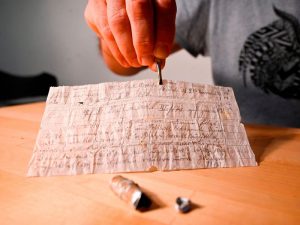
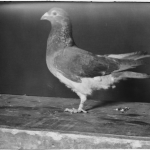 and it did not get through, finding it now is unfortunately more than a century too late. Halaoui discovered the long-lost message just a few hundred yards from its site of origin, so Jardy suspects that this capsule slipped off the homing pigeon’s leg early in its journey. I hope that is true, because some of these pigeons were shot down. Others were caught by the hungry citizens and used for food, but some made it home and they were heroes of war too, because they brought important intel to the Allies.
and it did not get through, finding it now is unfortunately more than a century too late. Halaoui discovered the long-lost message just a few hundred yards from its site of origin, so Jardy suspects that this capsule slipped off the homing pigeon’s leg early in its journey. I hope that is true, because some of these pigeons were shot down. Others were caught by the hungry citizens and used for food, but some made it home and they were heroes of war too, because they brought important intel to the Allies.
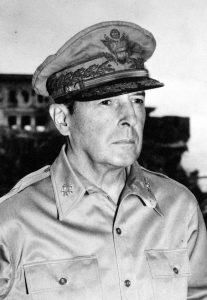 Opinions vary as to who the worst generals of World War II were, and I can’t say where I stand on the issue, but after researching several of the battles fought, whether won or lost, I can see how people could make up their own minds on the issue. It must also be noted that even the worst general can have enough good men under him to bring success through multiple blunders on the part of the general. Then, the general is considered a war hero. It doesn’t always happen, but sometimes, it does.
Opinions vary as to who the worst generals of World War II were, and I can’t say where I stand on the issue, but after researching several of the battles fought, whether won or lost, I can see how people could make up their own minds on the issue. It must also be noted that even the worst general can have enough good men under him to bring success through multiple blunders on the part of the general. Then, the general is considered a war hero. It doesn’t always happen, but sometimes, it does.
On September 14, 1944, the US 1st Marine Division landed on the island of Peleliu, one of the Palau Islands in the Pacific. It was part of a larger operation to provide support for General Douglas MacArthur, who was preparing to invade the Philippines. The Palaus were part of the Caroline Islands. They were among the mandated islands taken from Germany and given to Japan as one of the terms of the Treaty of Versailles at the close of World War I. The US military was unfamiliar with the islands, and Admiral William Halsey had argued against Operation Stalemate, which included the Army invasion of Morotai in the Dutch East Indies. He believed that MacArthur would meet minimal resistance in the Philippines, making this operation unnecessary, especially given the risks involved.
General William Henry Rupertus was the commander of the 1st Marine Division when they attacked the Japanese-held island Peleliu. Rupertus mistakenly predicted that the island would fall within 4 days. With that in mind, he sent his troops ashore with minimal water supplies. The battle was a horror show that dragged on for nearly 75 days. The Marines thought they knew how to attack the island, but the Japanese were using some new, innovative tactics, and so the Marines were unprepared. Nevertheless, Rupertus stuck to his original plan, even as casualties mounted, even withdrawing tank support for a critical assault, mistakenly believing it wasn’t needed. It’s actions like this that make you wonder how he ever got to be a general, I guess the Marines agreed, because Rupertus was pulled from command and soon died of a heart attack. The 1st Marine Division was pulled out after a month of vicious combat. They were in such bad shape that the division didn’t fight again for six months.
The pre-invasion bombardment of Peleliu had somehow seemed important, at the time, but it proved to be of no real help. The Japanese defenders of the island were buried too deep in the jungle, and the target intelligence given the Americans was faulty. Upon landing, the Marines met little immediate resistance, but that was a maneuver to get them further onto the island. Shortly thereafter, Japanese machine guns opened fire, knocking out more than two dozen landing craft. Scores of Japanese tanks and troops immediately stormed upon the marines. The shocked 1st and 5th Marine regiments fought for their lives. Jungle caves seemingly exploded with Japanese soldiers. Within one week of the invasion, the Marines lost 4,000 men. By the time it was all over, that number would surpass 9,000. The Japanese lost more than 13,000 men. Flamethrowers and bombs finally subdued the island for the Americans, but in the end, it all proved pointless. MacArthur invaded the Philippines without need of Army or Marine protection from either Peleliu or Morotai.
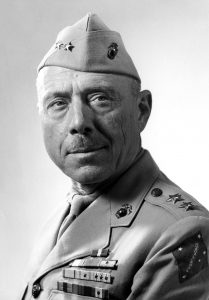
While MacArthur has a reputation as one of the most innovative and courageous generals in US history, he also committed inexplicable blunders at multiple points in the war. After the attack on Pearl Harbor, MacArthur was ordered to carry out pre-war attack plans on Japanese bases, but he gave no reply. As a result, Japanese planes immediately attacked, wiping out his air force. His thinly spaced and poorly supplied US and Filipino forces crumbled, and he was ordered to evacuate Manila with his command staff. About 150,000 Allied troops had been killed, wounded, or captured. His bold conduct over the next four years gained him a justifiable reputation as a war hero, but he was also reckless, arrogant, and careerist. He saw his role as the occupational governor of Japan as a stepping-stone to running for president and pardoned Japanese war criminals involved in human experimentation. These are not things that a general in the United States military should be doing, and while he was considered a hero by some, there were many others who would seriously disagree.

